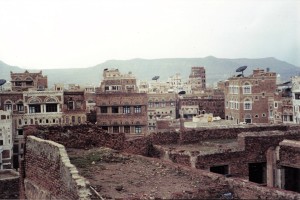
A war ravaged town in Yemen
Sana’a/Geneva/Washington/New York/Beijing: The rebel Ansar Allah forces or Houthis continue to be on rampage in Yemen, and the international communities’ attempt to marginalise it only emboldens its designs.
Yemen, as it is, plunges deeper into a bloody winter after overnight airstrikes by the Saudi-led coalition on the capital, Sana’a. At least five civilians – all members of the same family including two women and a child – were reported dead in the airstrikes when their house was hit in Ma’in district of the city at around 21.25 local time. Two other women and a child were also reported to have been injured.
Attacks on civilian infrastructure and civilians are prohibited by international humanitarian law.
The latest airstrikes followed missile and drone attacks claimed by Houthis on the United Arab Emirates (UAE), which is a coalition partner, on Monday, January 17, 2022. These attacks on Abu Dhabi’s International airport and a nearby industrial area were reported to have left three civilians dead, and immediately invited international criticism.
While the United States’ national security advisor Jake Sullivan stated in Washington that the US will work with the UAE and international partners to hold them accountable, he made it clear that the American commitment to the security of the UAE “is unwavering and we stand beside our Emirati partners against all threats to their territory”.
China too today condemned yesterday’s attacks on civil facilities in the UAE, including the Abu Dhabi International Airport. “We support the UAE’s effort to safeguard security and stability and call on relevant sides to refrain from actions that will escalate tensions in the region,” it stated.
Significantly, the United Nations Secretary-General, António Guterres, stated yesterday in New York that there was no military solution to the conflict in Yemen, and urged the parties to engage “constructively and “without preconditions” with his special envoy, Hans Grundberg, with the aim to advance the political process to reach a “comprehensive negotiated settlement and to end the conflict in Yemen”.
2022 had already seen the conflict intensify. The year began with a large counter-offensive by Government forces against Ansar Allah in Shabwah Governorate to the south-west of Marib, with the fighting now pushing further into Marib and Al Baydah Governorates. In recent days, there have been dozens of airstrikes and artillery strikes launched by the parties with seemingly little regard for civilians.
“We are deeply concerned by the continuing escalation of the conflict in Yemen,” Ravina Shamdasani, Spokesperson for the UN High Commissioner for Human Rights, told reporters in Geneva today.
The fighting has damaged civilian objects and critical infrastructure, including telecommunication towers and water reservoirs, as well as hospitals in Sana’a and Taizz. With frontlines shifting rapidly over large areas, civilians are also exposed to the constant threat of landmines.
Among recent attacks, between January 9 to 11, 2022, three telecommunications towers were destroyed by Saudi-led Coalition airstrikes in Sa’ada Governorate. On January 11, coalition airstrikes destroyed a main water reservoir in Sahar district, also in Sa’ada Governorate, disrupting water supplies for more than 130,000 people.
On January 13, 2022 airstrikes by the Saudi-led coalition injured four civilians and partially damaged the emergency and in-patient departments of a hospital in Al Sawad area, Sanhan district, Sana’a Governorate. It was reported that the airstrikes targeted a military camp, which is located close to the hospital. On 1 July 2020, airstrikes destroyed the hospital’s medical supply warehouse and severely damaged the building.
On January 15, two missiles fired by Ansar Allah forces positioned in the north of Taizz City struck and damaged Al Thawra Public Hospital, Taizz City. Three others missiles reportedly struck a neighbourhood adjacent to the hospital, injuring two civilians.
Figures collected by the UN Human Rights Office in Geneva indicate that, so far in January, 2022, there were 839 airstrikes by the Saudi-led coalition, compared with 1,074 for the whole of December. There were some 16 drone strikes, and 12 ballistic missiles and three other projectiles fired by Ansar Allah forces towards Saudi territory in December. To date in January, reports indicate there have been 10 drone strikes towards Saudi Arabia.
“Amid this escalation, we call on all parties to ensure the protection of civilians and civilian objects, in line with their obligations under international law. Any attack, including airstrikes should fully respect the principles of distinction, proportionality and precautions in attack,” Shamdasani said.
The Office of the Chief Human Rights Commissioner of the United Nations today called upon all parties to the conflict to must take all feasible measure to verify that targets are indeed military objectives and suspend an attack if it becomes apparent that the target is not a military objective or that the attack would be disproportionate. “Failure to respect the principles of distinction and proportionality could amount to war crimes,” it warned. It also echoed the UN Secretary-General to all parties to exercise maximum restraint and avoid escalation, and concurred with his analysis that there was no military solution to the conflict in Yemen.
– global bihari bureau





